“When an old man dies, it’s a library burning.” (Amadou Hampâté Bâ)
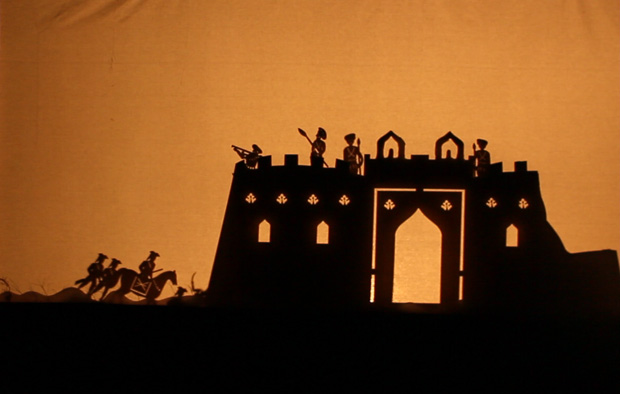
The Tiger Comes to Town project (June-December 2012) used shadow puppets to tell the story of the fall of the Bangalore Fort in 1791.
Public history looks at the many ways in which history is put to work at multiple sites – in museums, in places of pilgrimage and in archaeological excavations. The discipline also looks at modes of historical preservation in archives and other heritage institutions and forms of communication about the past used in film and television documentaries. Public history explores history beyond the conventional classroom and brings together oral history, digital storytelling and archival practices with critical thinking through community memory, family history and institutional history projects.
Academic and institutionalized versions of history often obscure and elide the voices of many, and the discipline of public history seeks to recover and document these narratives in order to create a more democratically nuanced account of our past. The practice of public history attempts to make multiple histories readily available and accessible to all at cultural heritage sites and museums using archival resources that used documents, photographs, audio and video recordings. Public history also attempts to communicate history through virtual experiences online. At the cutting edge, the field continues to grow, offering opportunities to explore the connections between history, culture and archival practices through critical readings in this emerging field.
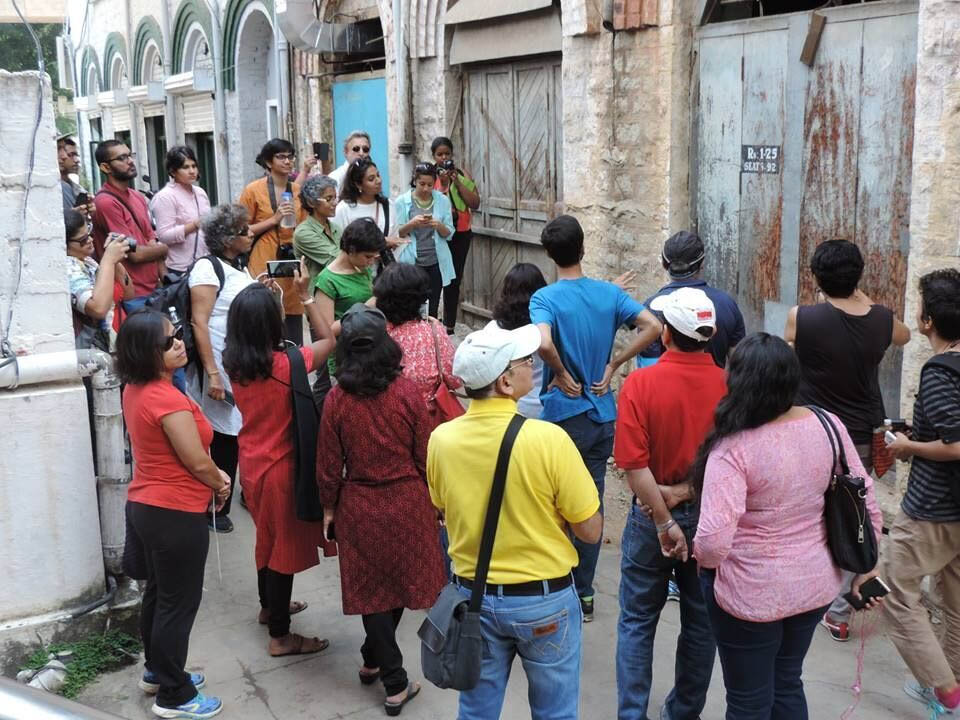
Participants at the site of the old Opera Theatre during an Arts Walk along MG Road curated by CPH and funded by the India Foundation of the Arts (2014).
The discipline of Public History and Heritage Interpretation offers students the opportunity to explore the connections between history, culture and archival practices through critical readings in the emerging field of public history. Students work with the Centre for Public History (CPH) on museums, archives and heritage management projects.
CPH runs regular courses and workshops for students of Srishti as well as short duration courses in oral history for PhD students, postgraduates and professionals.
Talking History
The “Talking History” course attempted to change the way we look at history. The focus of history in its conventional sense has been political – from the lives of kings and battles up to the medieval period, followed by the history of state formation from nineteenth century onwards. Conventional historical methods have often ignored the rich human stories that could be garnered out of the lived experiences of the human subject. The course introduced students to recent shift in thinking about history that have moved in the direction of context, perspective, interpretation, dialogue, and meaning through methods that engage with the human subject. This course explored oral history as one of the key methods of documentary work. Student films made as end products of this course are now used internationally as teaching tools for oral history. The films can be accessed here: http://vimeo.com/talkinghistory/videos
What is Public History?
This course introduced Srishti students to the concepts of public history and popular memory to the foundation studies students. It was designed for students to rethink the idea that history exists in the distant past, removed from any contemporary experience or significance. Rather, we introduced public history as a concept that includes the public perspective, in terms of addressing the larger contemporary public as its audience as well as its source. As part of course work students read key essays that addressed this realization and visited sites such as the Bangalore fort and the government museum to understand how history is preserved, practiced and disseminated in these public venues. A key component of this course was oral histories. Students learnt how to explore ways of garnering public memory through interviews and how to research and archive them as a historical resources. The course included short reading assignments and field trips, followed by discussions, presentations and written assignments.
How to think about things: Introduction to Material Culture
This was a course about the materiality of objects: what things mean. Students of Srishti learnt theories and different perspectives from which to understand material culture, and investigated and interpreted objects found in museums, in homes, markets, cities and art galleries. They visited Janapadaloka – a Museum of agricultural implements and folk objects and also a wooden toy factory in Channapatna.
Stories under the Shade: Oral History and Public Spaces
An interdisciplinary workshop that focused on the use of interviewing methodologies and interpretative methods when working with green spaces in Bangalore, this workshop looked at Cubbon Park – a landmark park which was set up in 1870. Students of Srishti learnt one of the most important tools of the historian’s trade — oral history. They learnt how to carry out archival research, conduct oral history interviews with a variety of people who use the park for regular morning and evening walks, runs or visit it for family picnics. They studied the structures, buildings and public statuary inside the park and collect stories about them. They interviewed those who work in the park as gardeners or landscape architects or administrators. The research and the interviews enabled them to interpret the many meanings of this public space.
Oral History Certificate Course
The Oral History Certificate Course introduces participants who come from a variety of backgrounds to Oral History theory, interviewing, and archiving. Participants learn about the various stages of Oral History research, by exposing them to the range of theoretical approaches that Oral Historians discuss and use. The course includes a practical component on audio recording, transcription and archiving. It also guides students on how to design projects, and curate and present Oral History. Finally, participants also learn the different ways of interpreting Oral History interviews.
Winter School in Oral History
The Winter School in Oral History is an advanced course that introduces participants to cutting edge research in the field of Oral History. With a faculty drawn from across the world, the course involves discussions on methodology, archiving standards, ethical issues and forms of dissemination. The faculty over the last two years included eminent oral historians from India, Bangladesh, Pakistan, Italy, the Czech Republic and USA who present their latest research approaches through examples from their own work. There were mentoring sessions for participants who also had the opportunity to discuss their projects with the faculty.
Participants are introduced to the practical impact of new media and technology on oral history and storytelling. Participants will also be exposed to the contemporary theoretical breakthrough in understanding form and meaning. Alongside daily classes, we host public events at venues across the city.
The second Winter School was successfully held from 6th to 16th January 2015. The theme of the course was “Boundaries, Politics and Narratives: The intersection of Oral History, Place and Memory”. More details on Winter School at https://cphwinterschool.wordpress.com/
Conferences
CPH organized the first Oral History Conference: “Oral History and the Sense of Legacy” on 19 July 2011. Since then CPH has worked actively to initiate and host the first meetings of the Oral History Association of India (OHAI). CPH partnered with OHAI and helped organize the first annual conference titled “Oral History in our Times” with Alessandro Portelli giving the keynote address and about 24 presenters. The most recent “Oral History and the Dialogue between Memory and History” was held on 19th and 20th January, 2015 in Mumbai at Max Mueller Bhavan. Alexander von Plato was the keynote speaker. Other oral historians, Miroslav Vanek, Meghna Guha Thakurta and Heather Goodall gave lectures at the Conference. The conference had more than 16 presentations from participants all over India.
CPH Projects
- Indian Museum, Kolkata: CPH has just completed a book project for the bi-centenary of the Indian Museum titled The Lives of Objects: Stories from the Indian Museum.
- IIMSc Chennai: With Srishti Faculty Binu Bhaskaran, Gautham Dayal and Lavanya Sahi, CPH created an exhibition titled “Mathematical Conversations” at IMSc Chennai. This permanent exhibition was inaugurated on 2nd January 2013. CPH is also in the process of completing a book Looking back, looking forward: An Oral History of the Institute of Mathematical Sciences.
- IIM Calcutta: Archives, book and Exhibition: Curated by Alison Brynes, Srishti Faculty, CPH put together an exhibition at the closing ceremony of IIM Calcutta’s Golden Jubilee on 14 November 2012. CPH completed a book titled Citizens and Revolutionaries: An Oral History of IIM Calcutta, Delhi: Rupa, 2012. This was designed by Srishti Faculty, Kumkum Nadig of Kena Design.
- Oral History Archives of India International Centre, New Delhi.
- Oral History Archives of Economic and Political Weekly, Mumbai.
- The Tiger comes to Town: A Public History initiative: This collaborative project between the Archaeological Survey of India (ASI) and the Centre for Public History (CPH) worked with Srishti students on this site-specific programme that demonstrated the effective ways in which tangible built heritage can be linked with intangible cultural heritage.
- Bangalore Storyscapes: CPH has also been archiving the city through oral histories in a project called Bangalore Storyscapes. All CPH members, students and interns have recorded a diverse range of personal narratives that weave an exciting and distinctive story of Bangalore’s colonial and postcolonial past. These stories have been used as the aural backdrop for walking tours around central Bangalore.
Master of Arts in Public History and Heritage Interpretation
Some of the Courses and Workshops offered by CPH Click here.
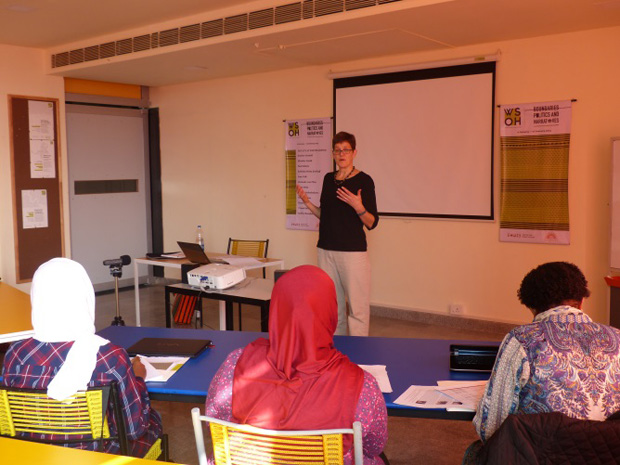
Master class by Dr Anne Valk, Associate Director for Public Humanities at the Center for Learning in Action and Davis Center at Williams College, Massachusetts, at Winter School 2015.
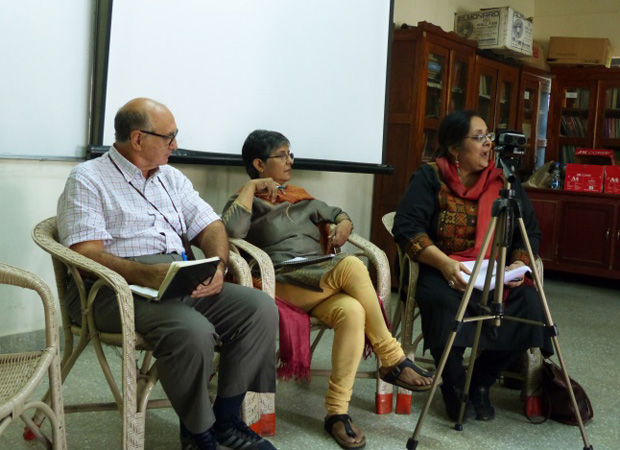
Oral historian Alessandro Portelli with Dr Indira Chowdhury and Dr Kavita Panjabi at a panel discussion during Winter School 2014.
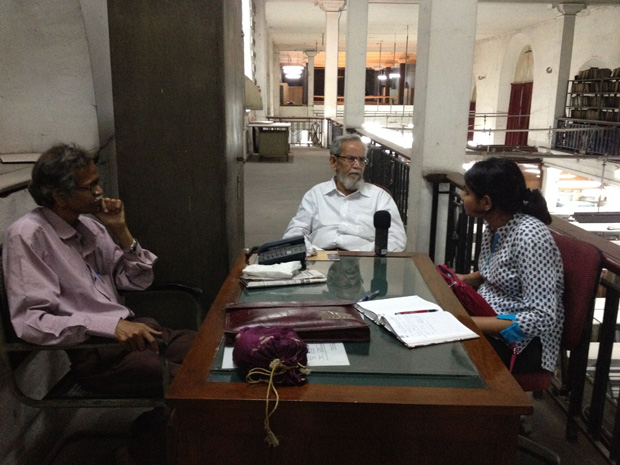
Priyanka Seshadri, research associate at the Centre for Public History, conducting oral history interviews at Indian Museum in Kolkata, 2014.
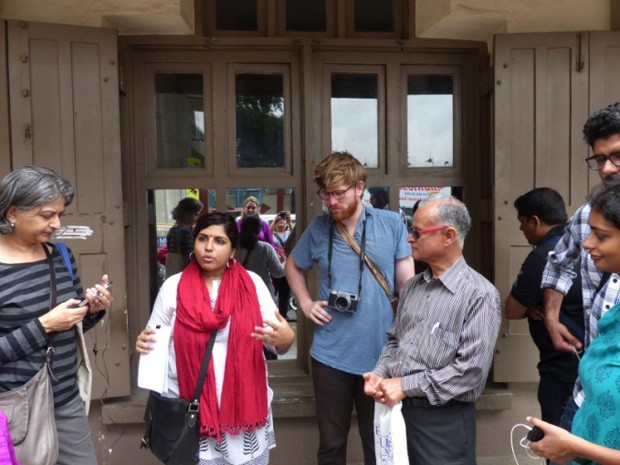
Avehi Menon, curator with Centre for Public History, leads a Bangalore Storyscapes walk on MG Road in Bangalore, 2014.
Public History all over the world has been using new technologies to bring alive the past. In this it works closely with the Digital Humanities. One of the endeavours of digital humanists is to use technology to display and recount narratives, enhanced with rich media and underpinned with robust metadata. Public historical research, thus, benefits greatly from such work, and at Srishti we are seeking to consolidate the relationship between the two disciplines and conduct research that is mutually beneficial to both.
Coordinator: Professor Indira Chowdhury
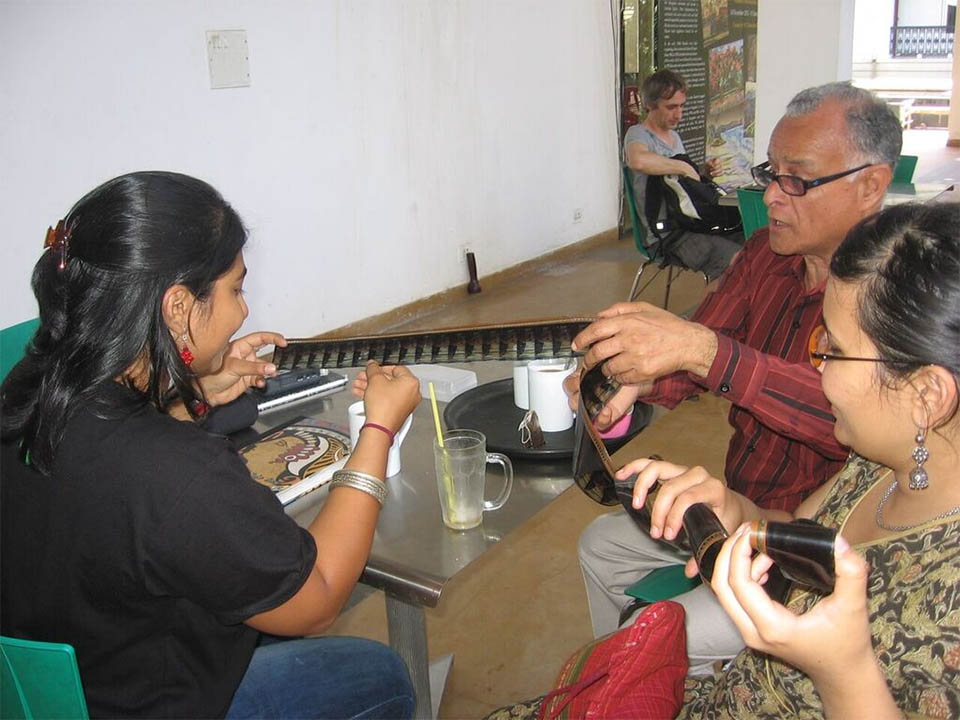
Listening to stories about cinema culture in Bangalore’s history and learning about film reels in the process (2012).
